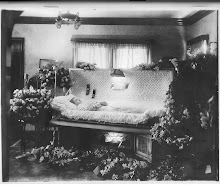Since the dawn of time, mankind has been memorializing and caring for the dead. Documentation over the centuries proves that this was the case as far back as ancient times and, before the advent of the "undertaker" or the more modern "funeral director", people in all societies took care of their dead. The concept isn't something that was thought of simply to profit from someones tears. Man has always felt it necessary to have an individual or group of individuals who would take on the responsibility of caring for their deceased families.
In ancient Egyptian times the thought was that they should mummify or embalm their dead. Even in those ancient times there were certain people who took care of funeral arrangements for the families of deceased loved ones.
The ancient Romans either chose cremation or burial and wanted the dead body to lay in state for all to view. A hand full of people could afford to have their loved ones embalmed and they were the ones who dealt with the "libitinarius", or as we call them today, funeral directors or yesteryear's "undertakers". Their dead would lay in state wearing special clothing that would have been purchased along with professional mourners all for the procession to the grave which was considered the ceremony. These customs are still upheld today and the funeral director makes all of these arrangements.
Ancient Greeks did not embalm and families of the deceased prepared the body for burial. Flowers and clothing for the dead were provided by friends and loved ones. The Greeks would only look at the body to be sure that the person was dead rather than sleeping. Friends and family would watch over their dead to be absolutely sure that no harm would come to the body between death and burial.
Cremation was not even a consideration for ancient Hebrews and the dead body was often buried without a coffin depending on the families choice. The body was buried the same day as death. Some believe this was because they had no way of keeping the body from odors and decomposition. It was not unusual for the family of the dead to perform all the tasks necessary to bury them. Today, there are still Hebrews who withhold these customs as can be evidenced by attending certain burials.
Early Christians thought that dieing did not mean an end of relations with that person, instead it was merely a way to move from one type of relationship to another. They also watched over the dead to be sure that the death had actually occurred; this vigil progressed into today's wake. As time went on, Christian funeral services were officiated by clergy or priests and some organized rituals concerning the dead were conducted much as they are today. As the years further progressed dignity became a part of the service. They began a type of embalming which included washing the body, applying perfumed oil on it, and then also wrapping the body in layers of cloth. This is where the embalmer got his name.
From what I've read, the English almost turned a funeral into a performance, there were hired mourners who made gloom and despair part of the show. The undertaker arranged this performance as well as taking care of the dead body.
In the eastern parts of America burial would usually include some sort of church service, prayers and ceremonies as it does today. The entire community seemed to become united after a death and in many communities this is still the case. During the nineteenth century, legislation began in which regulation of the embalming practice was seriously discussed. There was also a concern about the hazards to the health of persons who were around the dead prior to burial. Death Certificates became a requirement in various states due to changes in the law.
In the late nineteenth century, most funerals and their services were held at either the home of the deceased or a family members home. The undertaker did everything he needed to do right at the home. Most times a funeral wreath was hung on the door of the house to let all passers by know of a death in the home. After the funeral was over, the undertaker would be back at the home removing all elements of the funeral and it's services.
In America today, we have funeral homes where the dead are brought for preparation for the funeral. Some are prepared for burial and others are prepared for cremation but the end result is sometimes some type of funeral whether it includes a trip to the cemetery or a boat ride to scatter cremains. Rituals may have changed but emotions are still the same. The state laws of the nineteenth century have given way to many additional state as well as federal regulations and all must be adhered to when caring for the dead. There seems to have many changes over the centuries but the one constant has always been family involvement, until today. More and more people are opting to just "dispose" of the remains because they see no value in anything else. I don't care if you want me to help you or not, it's not the money, you need to have some type of service for yourselves. My only hope is that these same people don't have to some day regret the choice that they made not to be involved.
Subscribe to:
Post Comments (Atom)







1 comment:
This is interesting. Every culture has its rituals. I'm surprised about the English. I would not have guessed they were so expressive. But I would be forgetting Shakespeare and Johnson if I did that.
Post a Comment